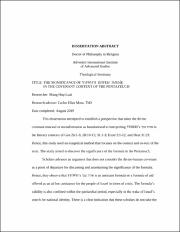| dc.description.abstract | This dissertation attempted to establish a perspective that takes the divine covenant renewal or reconfirmation as foundational to interpreting YHWH’s אהיה עמך in the literary contexts of Gen 26:1-6; 28:10-15; 31:1-3; Exod 3:1-12; and Deut 31:23. Hence, this study used an exegetical method that focuses on the context and co-text of the texts. The study aimed to discover the significance of the formula in the Pentateuch.
Scholars advance an argument that does not consider the divine-human covenant as a point of departure for discussing and ascertaining the significance of the formula. Hence, they observe that YHWH’s אהיה עמך is an assistant formula or a formula of aid offered as an ad hoc assistance for the people of Israel in times of crisis. The formula’s validity is also confined within the patriarchal period, especially in the wake of Israel’s search for national identity. There is a clear indication that these scholars do not take the
2
literary contexts of the formula seriously in their approach which, therefore, signals the need for another study that takes the contexts analytically.
In order to bridge the hermeneutical gap, this research analyzed each literary context of the selected texts and established that YHWH’s אהיה עמך is a formula of the divine covenant promise. This promise particularly deals with the renewal or reconfirmation of the previously established divine-human covenants to the succeeding generation of the original divine covenant recipients. The Abrahamic covenant was renewed to Isaac, Jacob, and the Israelites, and the Sinaitic covenant to the second generation of the Sinaitic covenant at the plain of Moab.
In the divine-human covenants, the promise of YHWH’s presence initiates and institutes the covenant relationship in the Pentateuch. The study of the grammar, syntax, and semantics has confirmed that YHWH’s אהיה עמך is the divine volitional asseveration that expresses the divine self-determination in making sure that the fulfillment of the covenant promises is fulfilled for the descendants of Abraham.
In addition to renewing and reconfirming the divine-human covenants, YHWH’s אהיה עמך also initiates the covenant relationship. Although God’s love is central, the formula has a relational significance in which human obligation and obedience are anticipated to maintain such a covenant relationship. Through the formula, YHWH reveals who He is and what He will do as the covenant God. At the same time, the contexts clarify that human response to YHWH’s אהיה עמך in faith, obedience, and worship is vital to the covenant relationship in the Pentateuch. | en_US |

